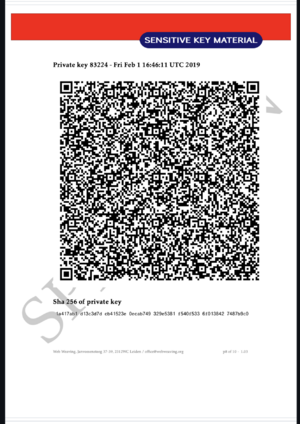Server backups / Duplicity: verschil tussen versies
(→Safekeeping of private key) |
(→Updating / renewing the encryption key) |
||
| Regel 106: | Regel 106: | ||
If not -edit gen.sh. Now run this script `for real' (ideally with a second person present; e.g. under [https://www.unido.org/overview/member-states/change-management/faq/what-four-eyes-principle Four Eye] principles. | If not -edit gen.sh. Now run this script `for real' (ideally with a second person present; e.g. under [https://www.unido.org/overview/member-states/change-management/faq/what-four-eyes-principle Four Eye] principles. | ||
| − | The result of this should be a file, e.g. ```public-key-45557.gpg | + | The result of this should be a file, e.g. ```public-key-45557.gpg``` that contains the public key. Copy this file into /etc/duplicity. |
Check that you can read it there; and extract the key identifier: | Check that you can read it there; and extract the key identifier: | ||
Versie van 13 okt 2023 om 14:05
Inhoud
[verbergen]Backup
There is a regular backup ran from systemd; /etc/duplicity. It starts with a full dump of all MySQL tables. It is encrypted against a public key; the private key of which is held by the Trustees of the foundation.
Crontab kicks off a script;
# monthly full, incrementals during the week. # 3 3 1 * * root test -x /etc/duplicity/run.sh && /etc/duplicity/run.sh full 3 3 2-31 * * root test -x /etc/duplicity/run.sh && /etc/duplicity/run.sh incremental
# Half year retention for full; 1 months for the incrementals # 1 1 * * 1 root test -x /etc/duplicity/run.sh && /etc/duplicity/run.sh remove-all-but-n-full 6 1 2 * * 1 root test -x /etc/duplicity/run.sh && /etc/duplicity/run.sh remove-all-inc-of-but-n-full 1
The script: run.sh:
#!/bin/sh
set -e
umask 077
HOST="xxx.backup.host"
DIR=/etc/duplicity
W=incremental
if [ $# != 0 ]; then
W=$1
shift
fi
T=
if [ $W = full -o $W = incremental ];then
T=/
mysqldump --all-databases --single-transaction --quick --lock-tables=false | gzip -9 > /var/lib/mysql-files/mysql-dump.gz
fi
# Verbose level 2 is errors and warnings; this way we skip
# notices and quell all output if the backup is a success.
#
PASSPHRASE="YYYPASSWORD" \
LANG=en_US.UTF8 LC_CTYPE=C HOME=$DIR GNUPGHOME=$DIR \
PYTHONWARNINGS="ignore::DeprecationWarning" \
python3 -W ignore::DeprecationWarning /usr/bin/duplicity $W $* \
\
-v 2 \
--hidden-encrypt-key XXXXX \
--hidden-encrypt-key YYYYY \
--sign-key YYYYY \
--ssh-options="-i $DIR/backup.sftp -oUserKnownHostsFile=$DIR/knownhosts" \
--no-print-statistics \
\
--include /etc \
--include /usr/share/mediawiki \
--include /usr/share/wordpress \
--include /usr/local/makerspaceleiden-crm \
--exclude /var/lib/lxcfs \
--include /var/lib \
--include /var/www \
--include /var/log \
--exclude /dev \
--exclude /sys \
--exclude /run \
--exclude /tmp \
--exclude /snap \
--exclude /var/tmp \
--exclude /proc \
--exclude /swapfile \
--exclude /etc/duplicity/.cache \
\
$T \
sftp://msl@$HOST/backups 2>&1 |tee /var/log/last-duplcity-backup.new | grep -v DeprecationWarning | grep -v algorithm=hashes.SHA1
mv /var/log/last-duplcity-backup.new /var/log/duplicity.log
mv /var/log/duplicity.log.gz /var/log/duplicity.prevlog.gz || true
gzip /var/log/duplicity.log || true
exit $?
Importing a new public key is done as follows
cd /etc/duplicity
cp XXXX/public-key-12345.gpg .
gpg --homedir . --import public-key-12345.gpg .
gpg --homedir . --edit-key XXXXXX
trust 5
save
And test by running it manually
sudo /etc/duplicity/run.sh incremental
Safekeeping of private key
The code at https://github.com/dirkx/gpg-offline-batch-key- can be used to keep a backup off line.
It yields a printout like https://github.com/dirkx/gpg-offline-batch-key-/blob/master/sample-output.pdf.
Updating / renewing the encryption key
Check out ttps://github.com/dirkx/gpg-offline-batch-key- and make sure you can run the 'sh gen.sh -d' as described in its README. This is to ensure you have all the dependencies (such as qrencode, libquirc and so on). This should complete with a generated PDF.
Next check that your printing subsystem works and that by default it goes to the right printer -- by doing:
echo test | lpr
If not -edit gen.sh. Now run this script `for real' (ideally with a second person present; e.g. under Four Eye principles.
The result of this should be a file, e.g. ```public-key-45557.gpg``` that contains the public key. Copy this file into /etc/duplicity.
Check that you can read it there; and extract the key identifier:
export GNUPGHOME=`pwd`
gpg2 < public-key-45557.gpg
This should show something like
pub ed25519 2023-10-13 [SC]
18109A9D225C92999511E565E399BDCDE55FFF07
uid key-45557
sub cv25519 2023-10-13 [E]
Next import it into the local key store with:
export GNUPGHOME=`pwd`
gpg2 --import public-key-45557.gpg
And make sure your GPG trusts it:
gpg --edit-key 18109A9D225C92999511E565E399BDCDE55FFF07 trust quit
Then edit 'run.sh and add the key (18109A9D225C92999511E565E399BDCDE55FFF07) in this example to the list.
Finally run the scrip to check all is well. This will take a few minutes.
sh run.sh
sh run.sh incremental
Ransomware/targeted risk
This approach is not overly resistant against a targeted delete - as the sftp user can delete/modify files (as the retention is currently done from the 'source'). This is, to some extend, mitigated by zfs snapshots -- but not sufficiently at this time.
Restoring a file
To restore a single file - there is a script in
/etc/duplicity/restore.sh
that is a wrapper for duplicity restore. Typical use is
restore.sh restore --file-to-restore etc/foo/file.txt --time 2023-01-01
and it will put this in 'restored-file'.
History
2022/12 -- Changed to longer incremental runs; with only monthly full's.
